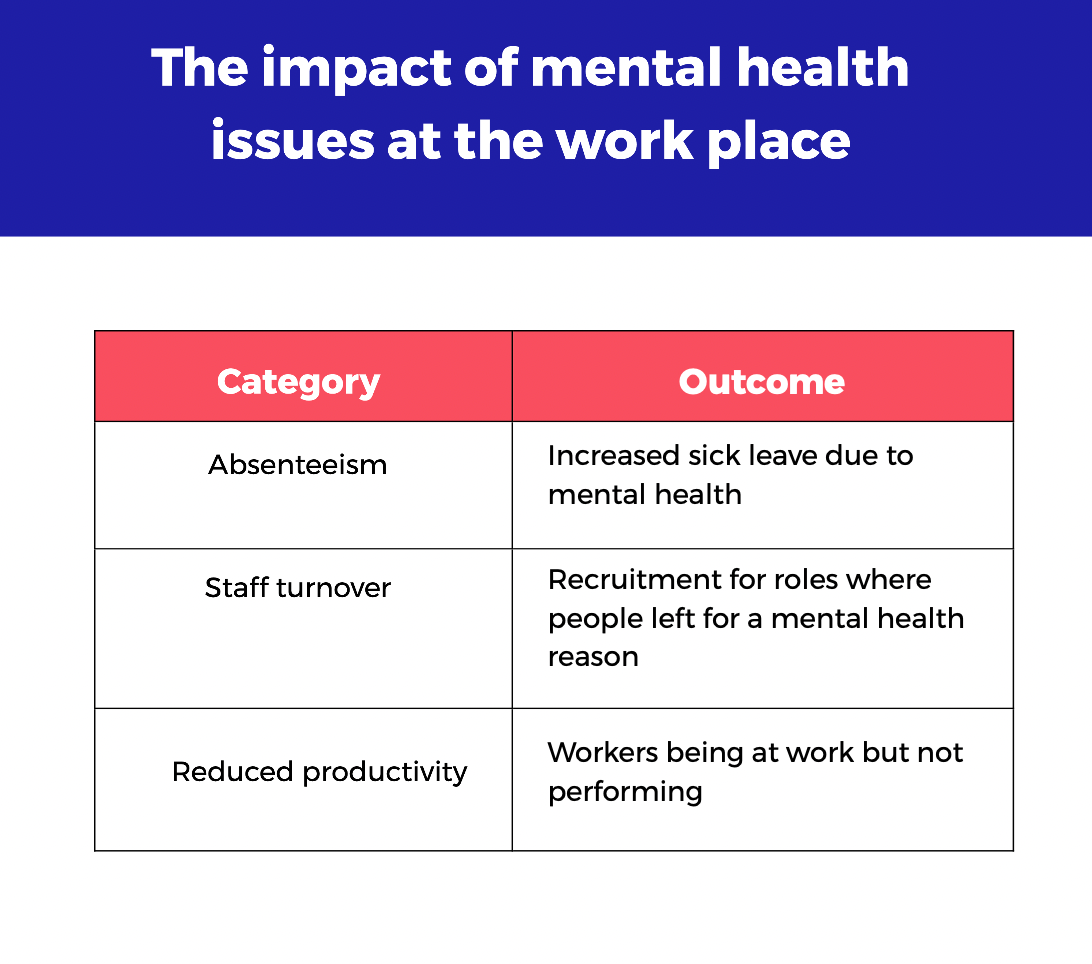The topic of mental health at work is something that has been largely stigmatized in the work environment for years. Yet, discussing mental health at work is important to ensure your staff's duty of care and the productivity of your team.
As the CFO, your role is about more than ensuring the financial health of the organization is in top shape. You’ve also got a responsibility to your team to make sure that their mental well-being needs are met.
Good mental health should be one of your top priorities as not only a CFO but a human being. After all, looking after your mental health is key to a more fulfilling, happier, and productive life – both in and outside of the workplace.
To be a truly great CFO and leader, you need empathy and an understanding of mental health.
In this article, I talk about the importance of addressing mental health and how you can better support your employees’ mental health at work, as well as your own.
Key topics covered in this article:
- A brief overview of my own mental health journey
- What it means to be in a 'good place'
- Some of the most common mental health problems
- Why mental well-being is important at work
- Examples of work and personal life circumstances that can trigger poor mental health
- Tell-tale signs of a change in mental health
- Tips to improve your mental health
- How to take care of your team’s mental health
- How to practice psychological safety in the workplace
A journey towards embracing good mental health
I believe that everyone has their own mental health journey, whether they realize it or not. For me, my journey toward good mental health was about understanding the world around me, and the people in it. I had to learn to open my eyes and ears to truly listen to those around me so I could fully understand what they were going through.
When I was younger, my grandma had severe depression. I was too young, or perhaps too ignorant, to really understand what she was going through. I couldn’t see it at the time for what it really was.
At that time of my life, I had just been promoted to my previous position, so it really should’ve been a happy time of celebration for me. However, I was also going through a breakup and somewhere along the way, I could feel that the light at the end of the tunnel was fading. I was overworking and couldn't stop thinking about work. And I realized that even though it’s nicer to sit in a Mercedes and cry, you’re still crying.
I knew something needed to change and I knew I needed help to do it. So, I talked to my boss about it, which was uncomfortable because I was recently promoted and instead of showing how capable I was by society’s standards, I showed that I was struggling. I did it anyway and it turned out to be one of the best decisions I’ve ever made. I was treated with respect and received support from not just my boss, but my colleagues too.
Talking about mental health at work isn’t easy because there’s a stigma to it, but it’s up to us as leaders to make others feel safe to share their struggles and be supportive of them. Whilst it was a one-time experience for me it has taught me a lot about how I can support colleagues if they are struggling.

What does it mean to be in a ‘good place’?
As the CFO, you have a lot on your plate and at times, it can be very overwhelming, which is why I want you to take time to reflect on your own mental health and what you can do to help support the mental health of your colleagues and staff.
You’ll often hear people talk about being in a good place mentally, but what does that really mean? How do you know if you’re in a good place or not?
I think being in a ‘good place’ looks different to everyone. Just as our journey towards good mental health is unique to us, the destination is also unique, which means there isn’t one single definition of being in a ‘good place’ that is relevant to everyone.
However, there are a few common signs that could indicate you’re in a good mental state. When you’re in a good place, you can:
- Handle stress
- Be empathetic
- Work productively
- Realize your own abilities
Although it’s a complex and broad term, a strong sign that you have good mental health is that you can see the light at the end of the tunnel. If you find yourself in a rough patch, you can see a way out. You find the solution and you can get out of that dark place fairly quickly.
On the other hand, if you’re struggling with your mental health, you might find it difficult to see any form of light at the end of the tunnel. When you’re really down, it can also affect your ability to recognize suffering in others and you may struggle to work productively.
However, it’s important to remember that having good mental health doesn’t always mean you’re happy. There'll be times in your life when you feel sad, but the difference is that you’ll know how to deal with the sadness, and you won’t let it consume you entirely.
The most common mental health problems
In the UK, one in four people will suffer from a mental health problem at some point in their lives. If you think about how many people are in your finance team or the entire company and then work out the math, you may be surprised to learn that a large number of people you work with could be struggling with mental health.
Some of the most common mental health-related issues include generalized anxiety disorder and depression.
The most common treatment options for these issues include:
- Psychological therapy
- Medicine
- Lifestyle changes
Although treatment can help, it’s not always effective at solving the underlying issue. Therapy is extremely useful, but it can be difficult to book an appointment with a professional, particularly through the NHS. Some medicines do help, but finding the right option can be difficult.
Lifestyle changes are good and beneficial but if you have depression, it might be really difficult to motivate yourself to make those changes as there is a disconnect between rational thinking and emotional thinking.
Why is mental well-being important at work?
Supporting the mental health of your employees is so important because people are at the heart of every organization. Whether you’re a start-up or a huge enterprise, your people and their mental health should be at the top of your priorities.
The impact of mental health issues at the workplace:

So, what does this mean for the business and you as the CFO?
Well, each of the three categories affected by poor mental health have a financial impact on companies, namely economic costs.
According to Enterprise Research, here are the economic cost impacts of each category (in the UK as a whole, not individual businesses):
- Absenteeism - £6.8bn
- Staff turnover - £8.6bn
- Reduced productivity - £26.6 - £29.3bn

What circumstances can trigger poor mental health?
Learning how to spot mental health issues at work can be extremely beneficial for leadership because when you know the signs, you can take a proactive approach towards making sure that person is supported.
There are countless circumstances that can trigger ill mental health, and some may be more obvious than others. However, here are a few circumstances to be aware of so that if any of your employees experience one of them, you can make an extra effort to help and support them through it.
Personal life changes

Bereavement – losing a family member, friend, or pet can be devastating. Making sure your employee gets the support they need is so important, as well as being understanding and empathetic.
A relationship breakdown – not all employees will be the first to tell you that they’ve just separated from their partner, so this can be a tricky one to spot.
Having children – although having children is a beautiful thing, it’s a huge adjustment for mothers and fathers alike. Many parents experience ill mental health after having a newborn.
Health issues and health scares – many people are reluctant to talk openly to their employers about health scares. But dealing with a serious health issue or something that will have a massive impact on their life is something that can really affect someone’s mental health.
Changes at work

Starting a new job – somebody new to the company might struggle, especially if they’re a remote worker as it can be easy to feel excluded. Try to make sure they feel involved and spend time to make them feel like part of the team.
Coping with an increased workload or a promotion – getting a promotion is very exciting, but it can also be incredibly daunting and it can come with a mountain of pressure to prove that you made the right decision by promoting them.
Poor relationships with colleagues or managers – if two team members don’t get along, or one is bullying the other, etc., it can quickly spiral out of control and lead to poor mental health. Try to be observant and spot potential warning signs that two people aren’t getting along and see if you can do something about it.
Redundancy or fear of redundancy – being worried about losing your job is not a pleasant experience. It’s a stressful situation to be in, so you need to be as supportive as possible if your company is facing some redundancy issues.
Tell-tale signs of a change in mental health
How can you tell if someone has a potential issue with their mental health?
It can be difficult to spot the signs, but it’s helpful to at least be aware of a few common signs that a person may be struggling, some of which include:
Work | Physical health | Mood |
Increased errors | Frequent headaches/stomach upsets | Aggression or tearfulness |
Taking on too much work | Difficulty sleeping | Indecision, inability to concentrate |
Working long hours | Lack of care over appearance | Conflict with colleagues |
Struggling with fairly easy tasks | Sudden weight loss or gain | Increased consumption of caffeine, alcohol, cigarettes or sedatives |
Tips to improve your mental health
Helping others starts with helping yourself. If you take care of yourself, then you’ll be in a much stronger position to help and support your team.
So, here are a few tips to help improve your mental health and well-being:
- Be active – the power of movement
- Take notice – the power of mindfulness
- Learn – the power of knowledge
- Give – the power of charitable actions
- Connect – the power of community
How to take care of your team’s mental health
As the CFO, you have a lot more power and influence than you might realize. You can shape the company and take active steps to make sure your finance team feels safe to talk about mental health and ask for help if they need it.
Here are a few suggestions to help support your employees:
- Make sure the working environment is safe and free of discrimination (legal obligation)
- Employee assistance hotline
- Mental health first aiders
- Offer training for managers and employees around well being
- Staff survey – measure over time
Investing in your employee’s mental well-being is a worthy investment for any business. A study recently showed that every dollar you put into mental well-being pays back three times as much. So, investing in mental health is also beneficial from a financial point of view.
If you’re the CFO of a company or a Director of Finance or someone in a leadership role, it’s important to think about how you can support your team. Here are some of the best ways to take care of your employees as a leader:
1. Be a role model
One of the best things you can do is to be a role model for what good mental health looks like. Take care of yourself and don’t overwork because if you do, your team will feel obliged to overwork as well and that can have an impact on their mental health. They may want to go home and spend time with their family, but when they see that the CFO is working after hours, they’ll feel like they need to meet those same standards.
2. Be vulnerable
You should also try to be more vulnerable to foster a culture that embraces talking about issues. If you always have a solid wall around you, people will struggle to open up to you because you’ve never opened up to them either.
If you want your team to trust you enough to feel safe opening up about their mental health struggles, you need to make a conscious effort to be someone they feel safe talking about such personal matters.
3. Reconstruct your 1:1s
Your 1:1s with your team shouldn’t solely focus on work content. Yes, it’s important to meet deadlines, achieve KPIs, and so on, but those 1:1s offer a great opportunity to get to know your team and build a good relationship with them.
My advice to any CFO who wants to develop a trusting relationship with their team is to reconstruct your 1:1s to contain less work content and make employees feel like they're safe to talk about other issues.
4. Be transparent
As a leader, it’s up to you to make sure everyone feels included. So, you need to be transparent where possible. If you have been leading a team for a while, you’ll know that the smallest thing can make people feel excluded.
For example, maybe you forget to copy someone into an email, which feels marginal to you, but they may feel left out when they hear their co-workers discussing the contents of the email. So, make sure that you share more rather than too little.

Practice psychological safety in the workplace
A lot of people feel like they’re under constant surveillance at work and if they make a single mistake, they could get in a lot of trouble or even risk losing their job.
So, you’ve got to make sure that your team feels safe in their roles and you can do this by practicing psychological safety, which is based on research carried out by Amy Edmondson ’99.
The premise of practicing psychological safety is based on three things:
1. Being able to bring up difficult topics
2. Owning up to your mistakes
3. Not fearing negative consequences
Give your staff the room to fail without fear. You don’t want everyone on your team to make huge mistakes all the time. But, when a mistake does happen, try to be more understanding about it.
Doing so will make your team feel more confident to own up to their mistakes and bring up difficult topics without fear of ridicule.
Psychological safety is about giving people reassurance and confidence to do their jobs without fear. But it’s not a free pass to be disrespectful.
Practicing these things will enhance teamwork because people will begin to talk to each other in a different way that’s more open and freer. It’ll also lead to higher performance and productivity because you can make better-informed decisions, which is crucial for finance teams.
Mental health resources:
Looking for additional help and support? Here are a few mental health resources that may help you:
- Mental Health Matters (features links to resources, downloadable leaflets, and websites about different mental illnesses and mental health conditions, etc).
- NHS (find information and support for your mental health - UK).
- Mental Health First Aid (includes some helpful resources - USA).




 Follow us on LinkedIn
Follow us on LinkedIn




